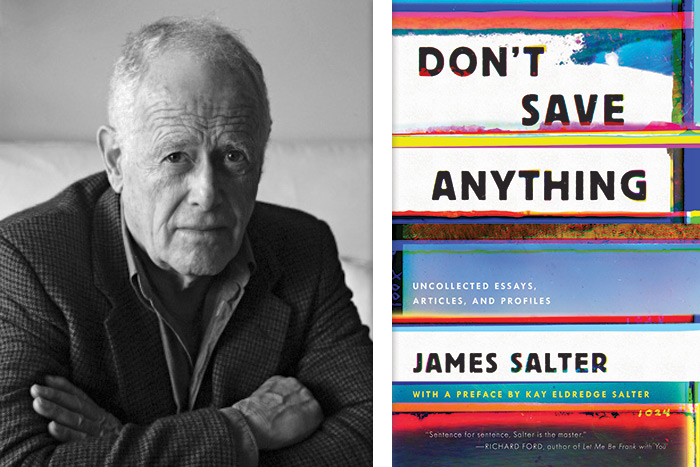By the Book: Don't Save Anything by James Salter

James Salter, who died in June 2015 in Sag Harbor, is one of the greatest, most underrated American writers. The author of A Sport and a Pastime, Light Years, and The Hunters, Salter was also the recipient of numerous prestigious literary awards. Pulitzer Prize-winner Richard Ford once said, “James Salter writes American sentences better than anybody writing today.” Salter more than proved his literary worth during his lifetime. His life was just as interesting and thrilling as his writing, and his recently published posthumous collection, Don’t Save Anything: Uncollected Essays, Articles and Profiles, speaks to this.
RELATED: A New Novel By James Salter: All That Is
The collection begins with a preface by Kay Eldredge Salter, the author’s wife. Heartfelt and wise, Eldredge creates a beginning for us as she gives us a behind-the-scenes look into the writing life of Salter. Despite the title of the collection, Eldredge states, “In a practical sense, he had clearly saved everything, not only finished copies of all he’d published but also all his notes and drafts.” With the addition of anecdotes from a day spent with Nabokov and the inventor of the artificial heart who insisted on being naked while cooking, we leave the preface feeling as though we know this man. Eldredge tells us exactly what we will find in this collection: “One of the great pleasures in writing creative nonfiction is the writer’s adventure of exploration, of learning about things he doesn’t know, then writing them down. That’s what you’ll find here.”
The collection begins with “Why I Write,” Salter’s exploration into how he became a writer. He goes through the lives of other writers, beginning with Leautaud, then moving to ponder on the thoughts of Sexton, Faulkner and Hemingway. Then we learn of Salter’s own life. He explains that his parents were not readers or writers, and that he discovered literary passion on his own. After attending West Point, and becoming a fighter pilot, he saw a novel that belonged to an old classmate, The Town and the City by Jack Kerouac. In this moment, writing became a priority to Salter, and even when fighting in the Korean War later, he wrote. Salter’s observations of himself are quite striking. He does not think everything he writes is gold—rather the opposite. It wasn’t until A Sport and a Pastime that Salter felt he was doing what it was he set out to do. Of this, he writes, “Overall I write because I see the world a certain way that no dialogue or series of them can begin to describe, that no book can fully render, though the greatest books thrill in their attempt.”
The rest of this collection allows us to see the world the way Salter saw it. His observations are acute and self-aware, while at the same time bringing beauty into everything he describes. This is true of his profiles on other writers—particularly in “Like a Retired Confidential Agent, Graham Greene Hides Quietly in Paris”—and his writing about his experiences in combat, as well as on gender. But he doesn’t disregard the seriousness of it all. He remains distinctly aware of context and politics, and brings these in with his poetic portrayals. We are left with Salter’s vision of the future, an important one, coming from a man with wisdom and clarity on subjects far and wide:
“Imagine that in time the society will divide into readers, who want information and don’t much attend to the form in which it comes, and Readers, who want music, implication, wit, transformation, resistance. You can guess who’ll be in charge…Where’s the glory in Reading your fate on a pulsing blue screen, or in a friend’s shrug and blank stare?”
Purchase Don’t Save Anything by James Salter, and all your other books, from your local bookstore.



